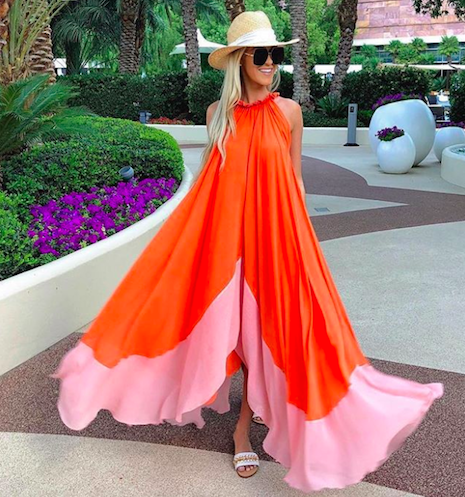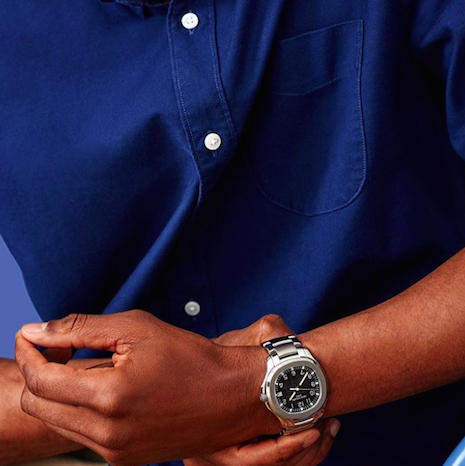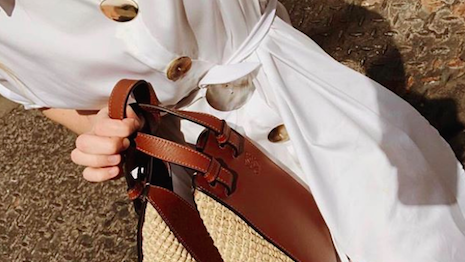NEW YORK - With the rise of luxury resale, renting luxury items and other new types of business models, the definition of luxury is getting murkier than ever before.
This was the subject of a panel discussion at the French-American Luxury Exchange held in New York on June 7, where a number of luxury executives spoke to the ways that new business models are upending traditional notions of luxury. During the sometimes heated debate, the executives shared conflicting definitions of luxury and ideas of what the future of the marketplace holds.
"The way we look at it is: is it luxury to have five watches through a lifetime or is it luxury to have experienced and enjoyed dozens and dozens of pieces throughout your life and maybe only buying a few?" said Olivier Reza, CEO of Eleven James.
"I think the experiential economy is very important and growing fast," he said. "There's a reason for that.
"Is it a millennial thing? Yes in some ways, because millennials are used to certain things. They are born and raised with certain things."
New business models
In the old days, there was really only one way to buy luxury: one went to a boutique, met with a sales associate and bought the products he or she liked.
In the past 10 years, however, the ways that conusmers can engage with luxury have exploded. There is luxury renting, resale, joint ownership, ecommerce and so much more.
During a panel called “The Voice of the New Luxury Business Models: Who Will Be the Winners?” a panel of executives explored the question of what these new business models would mean for luxury. One panelist took a stark stand against what the other three thought of as luxury.
"It’s a very different perspective that you have to have on luxury," said Gary Wassner, CEO of the Hilldun Corporation and chairman of Interluxe Holdings LLC. "The same consumer that is renting luxury is not necessarily one that’s buying it.
"It’s a different mindset. Luxury is something that people want to own for one reason and to borrow for another," he said. "People who rent luxury are going to be purchasing other products, but the people who buy it don’t also want to rent it.
"If you were having a party would you rent a piece of art for your wall?"

A Rent the Runway look. Image credit: Rent the Runway
This comment was met with strong opposition from his fellow panelists, all of whom practice the exact kind of business models he was referring to.
Maureen Sullivan, the chief operating officer of Rent the Runway, countered with the fact that many of the platform’s customers convert from renting items from brands to buying those same labels in the future.
Many of Rent the Runway’s customers are subscribers, using the service to try on new brands and get a feel for them in a temporary way before going out and buying them permanently later.
"Women use us as an extension of their closet," Ms. Sullivan said. "People want to come in in the morning and get dressed before work with us.
"People get dozens of shipments for us a year. We are building a utility in their lives."
Resale value
While discussion over whether renting or consigning high-end goods counts as luxury may continue, the fashion resale industry has been quietly growing at a massive rate.
The fashion market category that relies on consigning high-end apparel and accessories is witnessing a period of enormous growth, outpacing the full-price segment of its industry by 20 percent, according to a new report from Fung Global Retail & Technology.

A watch from Eleven James. Image credit: Eleven James
The entire resale industry is expected to grow from $18 billion in 2016 to $33 billion by 2021. This data comes from retail think tank Fung Global Retail & Technology, which released the "Fashion Re-Commerce Update" report to dig into exactly how and why this sector has been taking off (see story).
Julie Wainwright, the founder of The RealReal, had a simple explanation for why her company in particular has done so well: it does something simple that people want in an effective way.
"I never shopped at places like eBay because I was afraid of fakes," Ms. Wainwright said. "They can't monitor everything that they have.
"These brands are beautiful and made well – it's not really rocket science," she said. "We did it in a way that the intent was that we would keep the product intact."
{"ct":"i4sAp7pprgPJQO70q6zsAARVPmC06RQalF+bcDO0mepry3PqbcwazNnsh7U\/h\/G+MehreOtyD7IWu+xIFYrbYMpe\/X1WntimWZS\/HpZWu4X5RUcW8dkcHlPR5malA8aqfVfGdoW9XzNyG7I\/hfgJQ168bk9EvAnBejHB9\/+k9qzceQDZrtY4QngCjO8TX7bL\/d5cFmtBuZgTaudDmepmwfdf2QTzyBfyFd4i9S0ySTH77sEczfAQ6iRKZWCGcFmxhBA6DxZ31Ea\/ppp0AbxTX3malKPr15H27Ev+cRiDhg1sqFd7TvmmY+4w7YS3WnYnnu3K+74VvdyZ39zMedpYt1jPshDd0+NYffjxIHO7diltVkj4Goh\/UNenfsw2hGugNxMcJ0OjbzayJLGLn4FIQQ0TQ3n4senei\/iywrYX6vN12YsynEbC4iiZUoZOApgeRtp4bYMu\/hSPZFzlz3oTGNoyhNXRga4zMF5xVYGPxYRWPekgNl1pQ2XNpJdmAOhQFbVzAKUgw2J3I7TxyZwJ6i1LnxzlJfVBoBvzKEx1idZwuLUMth+o3jg9dJmBFzYtMqrXd\/ao06HIhcDZnDcZdrej+1ywi7dMf0qhM8wu\/NlwgBnQe8PFf30YCoKzBqFHer9POF+UhrZPL5t8r\/RSIv9Xc\/PCo2qGlIPQFlWijnhZVtANesubBgVBHb6p5iGjbk+FvsgWd8syWoHcxcfYS5EHb3zmiBBh5WeRBg+ObB0FzrIryrgu4w2v23mPG85hX+FzUnAbJhG2IvhsorKBIFR8zPQErcjx8dsiGs511etFUOYB4k9LY4G\/zew2fRvpCMIShZm937aE2UHdWFWJYO9YH7i8i7dVEdy3lwui6\/d7XQEC9Rq2JkXReFesrcKFa31en7e4uBK0chBqACG8kxSByLgvW4P5R7Vnj8l99X0boPv9o+n6gR4XHqL9vZmGBhQX77C1e5ANhKyOPVrymt04pvxOAuvmG1GKcvuhy79vm\/0ViabLF71CUn84BlIF4Lg\/ihIVVJ6a1MVNlfEcbKJoU+7p3aw6YFVUq5RbVoYNZBrasWj8CNtT9rSbR2DmNCOzmw3sJfOzKf8O0OFU4WmCHWLG2ojKCRRgSFUGtGH8BSYEgaPf0LY8xso8NAB9te209ljr1k89ToCmhlU0j\/Bw0P2F7byMIMiD3LTuMAXOhxGWIkJWjT1ExjzmqMTg5hRmGYC1HDTmsXkwU\/3eYBV08U4F\/iMcNP5\/VWdqFsadBwtVcdd1kVnCOPWbRjZ0C\/IG3qiqR+p3A64zNmPLFohcJjcecnCeLR4TUb9yNwq6zrk+NHcgC+Uh99o1VHkeqkCfDDao2qITEKMzoBdKVMtQuFnNHkfSopqygNq\/XErfskD+fRP60xnxTJBHHpeKal+VXHuzWGCXS\/T98wMG\/0IIMkiW88xdAaqjxnhTMJGdGd+r8v2foFEeMB6oQkQ0JDsMs7IvgcOHsGcZ2v9eIkjyuG6jZy4v+1qmPqDgikqRAaOwYnjy9U5mjDPl8Cib\/fXQFVxGQQF5fKoRRwzn1K+DeqF6au3n+d\/JUdzVW9P1KqTP7a2cstGevQSVZwHtNpEy799LYSmBTot9GTecyCs8AzaOuhfXnE3DQZmRxIoVNXUF6jXYFEB7Gg+2kVw2hjUZcuFjrJYCL3GaoNOzQ6HdO\/bpkoLyd57d4WGz6NykutPuRw\/4gAfGCcFnrCzVTiJvH8s3sHssBTcb2NLp\/RWTj45q0XWz36vUOtH5EJyDoPdBCx\/oAGTb3R+KhdEFmJwCs+7DtmJWDyGnzLBKXS7M+Ky0UTOxEZMP6Qp81gwMqgsOimq+k9yYfkUNS6FwMr6iMLuIdeom59GCHsAl9RZSkM7pdBz1uceI6HDEZ189YXNGXQmhi5T2Oz07Rh6j9cv7Q1PVjwyehGBb2x8c2LecI2vMsGJggIPzNHNUuoqSGq1nAn7AgJsvneSIKWo3BPYzXWob1xZvquOY2KBhrlxTyj9n5KrmQXEtnZiGO3+lGOuT6PGmkCC2V965+azolVM\/pMNwDbm71hA8iCx\/fbdI\/8FN9kcKTB\/5ZxqAr4iwlBpGGUo7hhLR+Ats7ZyTe8oa3uk2nCZqZM\/Xgx\/C546YjoXbiccwyR83JfKp0aKJm1yjAN4p3GaK6p21eofQcE2EZL9xxFcevN05FdKSaRv2zF5Pd6jFAuX3pAug5aw09+slVvEitdnkIWdle9XdM\/eBrYn1izPGyniWPi67e1sahnNdE3tNJmSLL5DK0ddCAZlylm5Yk9I9igZCvkmQ+2NcjewuBZg5cTrqKQW64fw4v7g2JmvKdy4MZwwgM6uhNEBRaSuPmcKvftvfbMoxxiBjd909R2DEm4P69w3S9M+anvBs1pWnn9SZpaunw\/pF3nKTXnsAJOBvPZyESI2oADyAoJi+Z2TUq\/kQad\/KgdlysU+XNLt29oC+rnV8lqChjHdiaf8QuPo6iOuKCx\/4oC2FFoNEEyPysmB8+qrqBlE6N10RPAeh03ol3+aGFN0kS2jkzb98XxcZ2i2sGqXrsXI\/oVGEqHaVqTNIhpIZyrYpMSPOJiiFYVVKdgKWhfjZHp2EP+YM3Zsil8QklvhHXnsuXhaBLegXXAu8F47Hw6d4TpmVZlZO65nu4w00vu\/xj36H6Vffc9q0dqwg6i8rUiIHDqGmOo5Qh\/UInqEEZTO8svaVq1AAKemZRzGArLLjf3zqMYT09FHv9GgdRO\/KmT6Mq9jxVNeONX599TnrQ\/CREzO7MxDC0MnTmYG8cxsGk4e5\/i7+hk3jpGWvEqM2qzHVkkQ\/QwZIY2jczHeMAfpGnltXvk6oRh6NlzzHIunKJ78G17r0MW3rEw7ZH3YFvRn3+qGkz6P6lsaX6wXh2UI6cHBmGp+BgkCqBCQS0LAUDEibb\/Neewa\/QAgVf9j6sU0zBwXACnxJd52dyMFfNvekG3RjlrksgEjB1bLBH8qRb7wH2PIX54BcSitmRWB4lqvsfd+fzoojEHBbnqibve\/JP7Tin77rD+0FN5palmxtCHKJeAoLONjvQn9PhxzNI1DEQojohCEXzQqGJeE+yqxDhNIClGY260lXfqhH0IGZ0K3qptMFiq8l9BGTDxVRzFrnri0xE7f+wUwGKPbOpk1jdhvleUbQLg8HLNhD7rrNekor2s2XUA8qa2S2j5CnXjVexmTmR+jOXzv31zBHiISyWEHBRLYUaA0tAa4iDY359gIoQbqAzaUAFLB\/VXUOjAlp2VD4uxMrvnteDMFqCycBYSIynAj7RP7cCXgfos+ZYVdguREz4Av4qMnR\/P5vfORC9u8G\/Nt1E6mu3guC3P80xWGpM9YoczyGnvoM93h+ILgJScprW9MgBUyVS99Y8XS8FqKdfo\/f+N+jZbAPKYYL4Gj3onVOswgO3VtlppLd28X4UDjVfqcPqLeF7r4c3c2vpCi3Hos2KJjHM8PuWWCSpYEBGD\/Q6DjF3dlavUflEt2XEMd27zsGfD5Wd3\/Vz\/puh698uL4UVXqlL74fqR4HhcLVZeaO7bzPnLS6foxJOwTy5Ni0sFPk9NlaOtfaC23lPFPtP54FALmjLSlEm\/4In59Z8gdbwJ43tApOgSjFDzTwz4qeAQ+qJPC50Hm\/AL3+9LCkE0BSX2\/8RJ5LfL4iaJkMlVlNAxsbp\/2QU6yUiYmtxwN+DMIIb9ZTVQuY\/\/EKhdA+JV97DkYQZt0Scur89jLz1S8D8BhtuDOKNxFWfVovNpBC4B7+xVqqxxTh9iP4Wrh\/48gUTWugm0eBvmGcJaZrnWehOnKnf3XzX+PkgdTJ0F5Hw9SGxqa3pVXd6Cm2Y44c6sHd9Q\/8df1JKER1Zud\/AOI9R5ZZUyM5ZnW7YdJ2ElOfnlOy+lgX5pnGPLoEibvbWO+ayNxPSk2Ym2iIDz2DPMQUG7p83U+cDBBF8u+GK\/Cq62Bcfo7EQwuN0r8TN41LjNKttWVQzB7rmBfy+i4eGe1SUgVINJRuzthoSGcfXD1K9A6hdAsEhBvTWsf9RDFnvuJh6yPPbY73ATk6Cnj17NzxfoDfaRqn1X+dIUZXES4KwFvMsb7n6ZPIEIVMatq\/z4wH1Ka9feb37OPN89PX+UBOV4nMFp3L048YfGQUISCpRqhLD+jrqkfX0+JuYvFTF\/gl8w9QMUp77+TL2s1Yku+sKjFynr1JVzpBYwFD3LxvOdYng5XVnV7ZMUSlnwaQmdEoTwI4XGxL0b9sUfMNkVaUQ+sXp1zEilRM7hdIXocujfxSzMx1bUgt71+kZ691JbvkV\/4qySGpE3SjjQswCpTi0TtpEhQ4R9pNbvCzXpGlxyLrm3v+iwScal\/Rk0\/tfj44uZ1b7WyielEhSYg\/\/h1RRN10Tz4Wh+tSE8nR9f7T3FyutBadEffavWQI16fw8cCFaxsvgR3mQMTK37OOxUFF7536ZQw5inAKwiCuYx\/7g7xZCSdmUjJgvAp5I\/83yYtJyfcCB42pt+aVp4x4uAclnLahuN+kW8jyYOn81ouu\/WBFnyWSHFj5jrdtwt9RBF5jY\/3+Hf4g54bX6GNPZdti0JtXel7LaW1+ADxQQ1wKP7EU0SW6zRX7eceHj+NeYytwEquS3QEzUt112vVMFglzILUStBJjNu1MPvuGjW2OilUFdo\/9YhhsT0nZl\/LPoLyM5lkkbrkmnZRTWOKBuM7lsmvRm6l\/ieb1wdrNllXbdQ9GIjzCX0gQ6ZzRZOfyrsxgTCnR0YxbT56E1ug4vBnGPjJzkmKs2bnVIM635XzrAmRwYSL47NXrtFVlAijEJs\/DL6uEZGeNiJP6+Ufy3uTzOFNXHkVroKQxPXzx8b5NJ2g142bU5pLOMxE2z8kkSATCp1oWM7EPPzGsTaiS44YFts8Omaqzdan5aWwnliJS9xFbF5\/hYZJwhXvN8SiRBMkEJbLH+rWaek8wrwxGTj2DMvlhJuW6cwsRjHLZjxQzQG3zZFXNSiVZEQJPdpF\/tm9jp80qAUPu\/uLH6nWGiAhrl1My2Izv0e+oCwu4QAa44Ox9jSB4kT2MzssKG4o9oQPvQBvwLicAGBt9piy7X7zpPADMUr9kQcKwK4yeKvNTWCUj0w7eUhV4ql25R4olkb5W8KIuew4jKZe2F064U1Lr7gZlOgArxTfFbjTEtJi\/rqeAZxJxGzCEjAj\/LSP\/FiVUBYWW38S2nejszybiX+\/aag3bJ2oPty1X1WxPV1\/kO8IVXX2hDDsqz99aIoa49feCnKPu8Zw+gZQwCD1RZbEY1FaIV\/54dhrr9HafhKOGfXNEygVUEXFE+qVzoaGqglMcQHiGBq7iXzstGvhspW7GS8CYt2TidpcPW1vUv4QJH3eiW44+LQzaSHZtwAbJlZSoGXVXVTn+w04imuTfb6vcXB2MVxgI48r6h7vl\/BY5f8oRx7mX\/eVBlsKPgTs9y+tGyiJ8fCkaRrw4lqQ1n+00BuA3lB4wkZlkcvKg24dU7X1PNMG7SoQnVPSO7Q86Ig0ctRiylhns4rStJtF1vOM6VKB\/ubPQdeET+p3j6GGKOExJqhYnUicXb1fmgQ9feKm8ws1rmfyl+F6LjfdAzGlh87mGKeNT65K91GqbSOYzVx759FQ3tpgplAAItkwKVb3CM2CXjiYr6JBvwDgu2WfR\/qDXvTTLx0ko3lxn\/srO8bBE8fGPoOKR99\/SwVYbqB1ChpTdlTtBb4hj4N\/yX9upHPmSGbhOSDE7TsvF8C81EwpZcUrnXl9AiVFywcMt4TTZBDI4f16msIDr0kH\/4cm2onOoJziJDWElYVEVv22eKDC9H7sFNFHNgSMMxq1EwWf\/amxsOSDEBNqrOhje6s0JQnWDOqWaIxWCwToS1NUSMJTioC2n+OpOIDPumDn5bundsctyxVrfpea9ELLmkI0ymeabZ+Ecye8IhEjTYd2bJdqCyenl3l6PJjCg4Sw2jvkD7w\/MsxpGCWE4dLhlCv9\/4uJPc2KVIv8W5GEsO0axECIS+uRWY89I9y3FhcjfKCUOKDGB6A3ZMCM+5QtBTZK1kblm9pU7j7kaqeMqxGo3dOcACHP9XQ6Msdc6WtU58N2o0IgNhRATv5gKcuv9VIzd7na\/9aTdglJ4WnAXQ\/RkWko+TwkUPC1jbZhUYUmOHys+JzE+Iy9pv+eUC6dpriYmO6Krb5rUYltI85XQ0Dp43U2uoi29o5wrhsFGqLAfgvhTFTDA+fFoMvU3m4EP24HvUPHbj4YLfnkPM9EN\/CYOX2IJzuqVFtxztr9YEkKpWxHaaFu8Ypfh74XCoiX2XEZok7D68pO2o4aY0XcdErTvui+GLIUluJ693Hr5+Yq+S91SYOl1ft1w8\/s9jiiNYOmDA\/Albj\/Sbg9RnoB9yabp3iSd7NQ2b2SRZQKUI+yxPckfxj4R6uGV2D66BE2rKN7L4J6zNgojgwwSv+R9vXShp5IB9\/+HIa+RzosTTOI3NKssabP3sWIi\/ErMLp7JBOHineEXcOLM4kekCgbBElCuB6et57P7zmtlsy6nv7HlpgalOt7w2Mxih94JIZawZFhL7UY6gh7njkc6ETlojt+tY+7ZXP91acA7381OrOv9yddMKMG\/rh6tcSi4oZEbu2hCbunGXL4geCZza\/08eeJwSLyzYe\/ToZRwqw7J7l9o+8zWg+g2PTz4C5IgviKAhIcH2aW3LVpqxue\/n+iZZLO5D0TBh\/nvvMlaWXbecD19lSBq2os0JIXJ4R3BWpya31px\/7qf5LmuB8bG7a6V8qmV4CRWM57Qu6nvkLpw7ClmvvyugHfD3fyyXElfFkoOrCtUGy6NIRF9fVWBeJ9MEMVobe8YcST4gmE7xcDwybXPM66Av1SI7pVgKQogqxopnZbpGS61yoNIku347jNF2wXjyDVbdjffYj44lISuzJfq9Qfr\/g1\/ooLvKIfGYNqNoMsMSC7g8+FUxNZ0er6ix7deYbguF7gtVCeHmszPfRWoozkJ\/XxPv2lh2bQY+O4VizmhUmxUilfFWqzuQZQvsIBSHkXfFYJAhTMTqn2d9d3+rgPS4f33naIz42eeBO3LZEQuM9UtSOcKlqhX07UTtqFB7\/7yEmCdlgtod0Dun5eVdhFB83cjwTT5nTGFz\/uPqw0CriisCujKlS7NqdmryXqFxBwbFMwF2MnGil\/t46NA\/bULwH+1\/dmfsgFrXWzKgLRKV3MRzADd5hEn+9nX0GfBDaAJMJYbj+Vd1i7yJHbPbnDL8J6bo5gpkGCZYgw3uxIuJsr43QjTM3UCgX+UgwHMIO1aNkwsMt8mo9GsmJhqaJkRYgM4qK7\/I9OYPiucx+0MhreUS25Eo3uNT5rh4p1T9gJDBVj8GpC5DHEAJ2nxRyybJC7E+l2lEHwE+rXbnQQPCG\/twb9TjoS9pzQfDBROu4H0LIOPqrnqBal1f7uku3Oj1a4AuXVZfozyGXAu\/P+5Bt++rN\/ctr6+OLZYab2FqumsoXEim0drNvAWAAIarcat372kZAu8MttaDDciAjir3Wir3sTrfboSIlGCIV0JtMAsaRuajOuME9D6sW9gDPRxSUZ9ChfFJdNb8kf65npr00bpIUs5e+cu5gUDN0sf2DumkMYqa5Th2NqJ5Ic36vcUr6URJFep01424ggTz5BQzvx22E3Bh17+caqv6cvDQMYrdbSsUxLrLFiE+uMwB9zIWguOmlbpL2J3UfUZ6M1Xlti8PD7JzeR6UK6pZHcUr+53bDR8XJ7q","iv":"7928bfbf19c5c8cd43cb30ba0b0beb62","s":"f1993ab5bfd050e6"}

 The luxury resale industry has gotten very popular in the last few years. Image credit: The RealReal
The luxury resale industry has gotten very popular in the last few years. Image credit: The RealReal